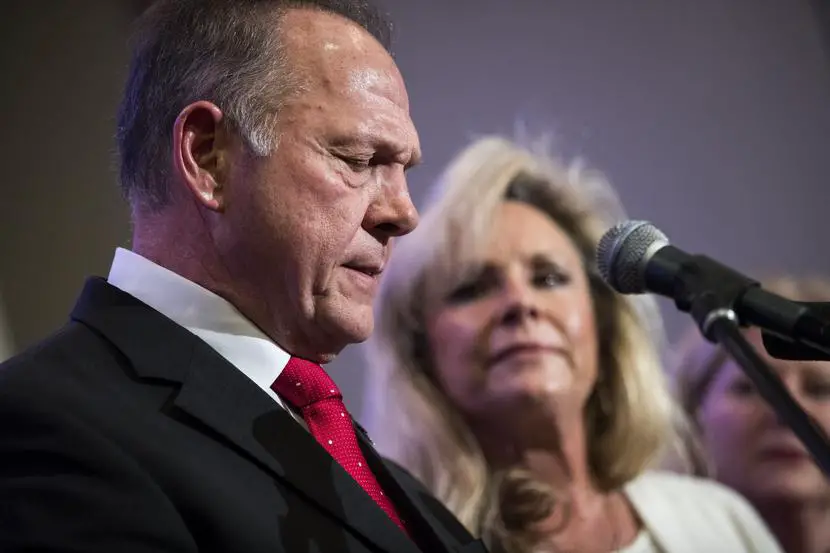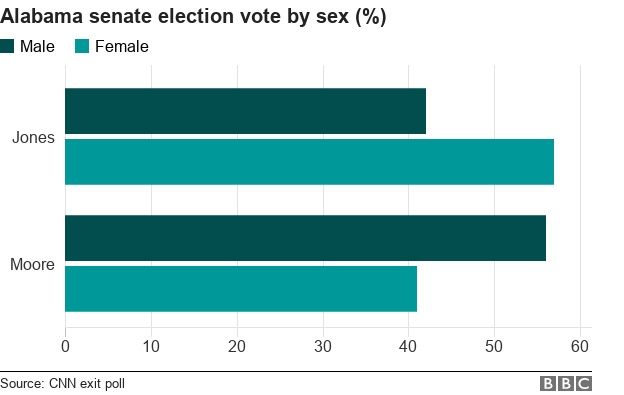The big story of 2017 was the bizarre, or we should say, “Strange” campaign and election in Alabama, for the senate seat left by Jeff Sessions, and temporarily filled by Luther Strange. There has been a lot of discussion about the race. Most pundits say that Jones didn’t win, Moore lost, but there’s more to the story.
The African-American voter turnout was amazing in an off-year election. If you like maps and statistics, here’s an interesting analysis. It shows how north/central and southern white Alabama gave Moore a 44,000 boost, but lower central “?Black Belt” gave Jones a 65,000 cushion.
Fox News says that Republicans should not worry about Moore’s loss, that it doesn’t mean anything, even though Democrats have been greatly over-performing in all the special elections this year.
Moore drew so much opposition for some of his extreme positions and sexual misconduct allegations, it would be wrong to read his narrow defeat as a repudiation of President Trump or the Trump agenda.
Poor ol’ Roy. On December 11 he was the best hope for the Republican agenda, and on December 13, he joined the gang under the Republican bus.
Sometimes it’s best to get the view from the outside. The BBC gives us a good analysis.
This chart shows the gender gap.
An almost exact mirror of the genders—with Moore lower in both genders, proportionately. The BBC suggests five takeaways.
1. An energised left
Prior to election day, Alabama officials estimated that about 20% of Alabama registered voters would show up to vote in this special election.
The latest figures put that number closer to 40%. Roughly 1.3 million ballots were cast in the state, and in county after county Democrats exceeded expectations, particularly compared to turnout from Republicans in their party’s rural and suburban strongholds.
It’s a trend that echoes the results in Virginia. . .2. Steve Bannon humbled
Roy Moore was supposed to be Steve Bannon’s first big victory, a cannonball fired into the heart of the Republican establishment and a visible example of the populist-evangelical electoral alliance he was crafting.
Instead, the former Trump campaign head and senior White House adviser has been humbled. . .3. Trump takes a hit
On Tuesday night, a magnanimous president took to Twitter to congratulate Mr Jones on his Senate victory.
This probably won’t be the president’s last word on the matter but for now, his reaction could reflect an acknowledgment that despite his support for Mr Moore, it wasn’t enough to pull his man over the finish line, even in conservative Alabama. . .4. The US Senate is in play
The Republican majority in the Senate narrows to 51-49, and the party can only afford to lose a single vote on any measure, thanks to Vice-President Mike Pence’s power to break a tie. . .More than that, it also puts control of the Senate squarely in play in the 2018 mid-term congressional elections. . .5. A #MeToo reckoning?
In the past week, three members of the US Congress – two Democrats and one Republican – have announced their resignations because of reports of sexual impropriety.
While their actions hinted that there would be a political price in the new environment of sexual-harassment sensitivity, the true test would come at the ballot box. . .
Politico viewed exit polls and they showed that the allegations against Moore—or more precisely, his responses—were the key to the election.
Fully 52 percent of voters said the sexual misconduct allegations against Moore were true, according to the exit poll — and 89 percent of them voted for Jones. By contrast, 43 percent said they were false, with Moore winning 94 percent of those voters.
Those are important numbers—89% of 52%, against 95% of 34%.
Politico also offers five “takeaways.”
• Bannon’s bruising [He went all in–expecting Moore to win, with Strange being the first GOP establishment domino to fall.
• What black voter problem? [Black turnout]
• Trump loses capital [Backing the loser after backing the loser in the primary]
• Revenge of the soccer mom [Romney won them by 55%, Moore only won by 11%]
• Democrats to Trump: Watch out
Meanwhile, Vox (not to be confused with Fox) got the inside story from Jones’ strategist, Joe Trippi, who had also managed Howard Dean’s 2004 presidential campaign. Trippi says the sexual allegations actually hurt Jones, since his goal was to reduce “tribalism”—that is, voting only for one’s own party. He says the sexual allegations actually boosted Moore, among white men, for instance. Instead, he blames Trump.
Trippi says the central insight of the Jones campaign was that many voters, including many Trump-friendly Republicans, are already exhausted by the chaos and hostility of Trump’s Washington, and they’re open to alternatives. That was the opportunity Jones exploited, and it’s a lesson Trippi thinks is a model other Democrats could learn from in 2018.
The consensus is that Democrats can win in 2018 if they can mobilize their base, particularly African-Americans, while also appealing to white women and the college educated.
But Democrats shouldn’t be overconfident about next year’s elections. They’re not likely to get to run against a candidate who dated junior high school girls—and more importantly, lied about it; who said being gay should be illegal; said the U.S. deserved the 9/11 attack as a punishment from God; said that Muslims should be barred from Congress; and said America has NOT been great since the time of slavery.
In one of his late speeches, he blamed the Civil War for our divisiveness, even saying “Reds and Yellows” are involved, meaning Native Americans and Asians are fighting, and said “maybe Putin is right” in his opposition to gay marriage; ridicules “Dreamers;” and still questions Barack Obama’s birthplace (which even Trump has given up on). He has also said there’s “no such thing as evolution, “ according to Business Insider, and that a lot of our problems were caused by the civil rights laws in the 1960s.
Democrats can’t count on the GOP to ever again come up with someone as weird to run against.
Donate Now to Support Election Central
- Help defend independent journalism
- Directly support this website and our efforts

